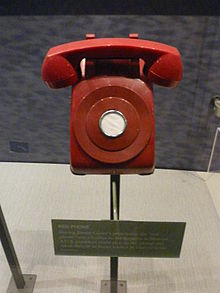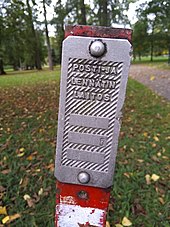
A hotline is a point-to-point communications link in which a call is automatically directed to the preselected destination without any additional action by the user when the end instrument goes off-hook. An example would be a phone that automatically connects to emergency services on picking up the receiver. Therefore, dedicated hotline phones do not need a rotary dial or keypad. A hotline can also be called an automatic signaling, ringdown, or off-hook service.
For crises and service
True hotlines cannot be used to originate calls other than to preselected destinations. However, in common or colloquial usage, a "hotline" often refers to a call center reachable by dialing a standard telephone number, or sometimes the phone numbers themselves.
This is especially the case with 24-hour, noncommercial numbers, such as police tip hotlines or suicide crisis hotlines, which are staffed around the clock and thereby give the appearance of real hotlines. Increasingly, however, the term is found being applied to any customer service telephone number.
Between states
Russia–United States

The most famous hotline between states is the Moscow–Washington hotline, also known as the "red telephone", although telephones have never been used in this capacity. This direct communications link was established on June 20, 1963, in the wake of the Cuban Missile Crisis, which convinced both sides of the need for better communications. It was the first time used by U.S. President John F. Kennedy on August 30, 1963 and utilized teletypewriter technology, later replaced by telecopier and then by electronic mail.
United Kingdom–United States
Already during World War II—two decades before the Washington–Moscow hotline was established—there was a hotline between No. 10 Downing Street and the Cabinet War Room bunker under the Treasury, Whitehall; with the White House in Washington, D.C. From 1943 to 1946, this link was made secure by using the very first voice encryption machine, called SIGSALY.
China–Russia
A hotline connection between Beijing and Moscow was used during the 1969 frontier confrontation between the two countries. The Chinese however refused the Russian peace attempts and ended the communications link. After a reconciliation between the former enemies, the hotline between China and Russia was revived in 1996.
France–Russia
On his visit to the Soviet Union in 1966, French President Charles de Gaulle announced that a hotline would be established between Paris and Moscow. The line was upgraded from a telex to a high-speed fax machine in 1989.
Russia–United Kingdom
A London–Moscow hotline was not formally established until a treaty of friendship between the two countries in 1992. An upgrade was announced when Foreign Secretary William Hague visited Moscow in 2011.
India–Pakistan
On 20 June 2004, both India and Pakistan agreed to extend a nuclear testing ban and to set up an Islamabad–New Delhi hotline between their foreign secretaries aimed at preventing misunderstandings that might lead to nuclear war. The hotline was set up with the assistance of United States military officers.
China–United States
Main article: Beijing–Washington hotlineThe United States and China set up a defense hotline in 2008, but it has rarely been used in crises.
China–India
India and China announced a hotline for the foreign ministers of both countries while reiterating their commitment to strengthening ties and building "mutual political trust". As of August 2015 the hotline was yet to be made operational.
China–Japan
In February 2013, the Senkaku Islands dispute gave renewed impetus to a China–Japan hotline, which had been agreed to but due to rising tensions had not been established.
North and South Korea
Between North and South Korea there are over 40 direct phone lines, the first of which was opened in September 1971. Most of these hotlines run through the Panmunjeom Joint Security Area (JSA) and are maintained by the Red Cross. Since 1971, North Korea has deactivated the hotlines seven times, the last time in February 2016. After Kim Jong-un's New Years address, the border hotline was reopened on January 3, 2018.
India–United States
In August 2015 the hotline between the White House and New Delhi became operational. The decision of establishing this hotline was taken during Obama's visit to India in January 2015. This is the first hotline connecting an Indian Prime Minister to a head of state.
See also
References
- The red phone that was NOT on the Hotline. electrospaces.blogspot.nl. 30 August 2013
- Derived from Federal Standard 1037C
- U.S. State Department. "Hot Line Agreement (1963)". Atomic Archive. Archived from the original on 30 August 2022. Retrieved 30 August 2022.
- "This Day in History - August 30, 1963: Hotline established between Washington and Moscow". HISTORY. Archived from the original on 20 May 2023. Retrieved 6 May 2023.
- ^ Egilsson, Haraldur. "The Origins, Use and Development of Hotline Diplomacy" (PDF). Discussion Papers in Diplomacy. Archived from the original (PDF) on 11 September 2011. Retrieved 22 January 2013.
- "India and Pakistan to have nuclear hotline". The Independent.
- Gienger, Viola (13 May 2011). "China-U.S. Defense Hotline Shows Gulf Between Nations". Bloomberg. Retrieved 5 March 2012.
- "Finally, a hotline between India and China". Ndtv.com. 1 November 2010. Retrieved 21 January 2012.
- "Narendra Modi-Barack Obama hotline becomes operational". 21 August 2015.
- Japan suggests hotline to Beijing over island spat. scmp.com. 9 February 2013
- North Korea reopens hotline to South to discuss Olympics BBC News 3 January 2018
- PTI "Modi-Obama hotline becomes operational", The Indian Express, Washington, 21 August 2015. Retrieved on 22 August 2015.